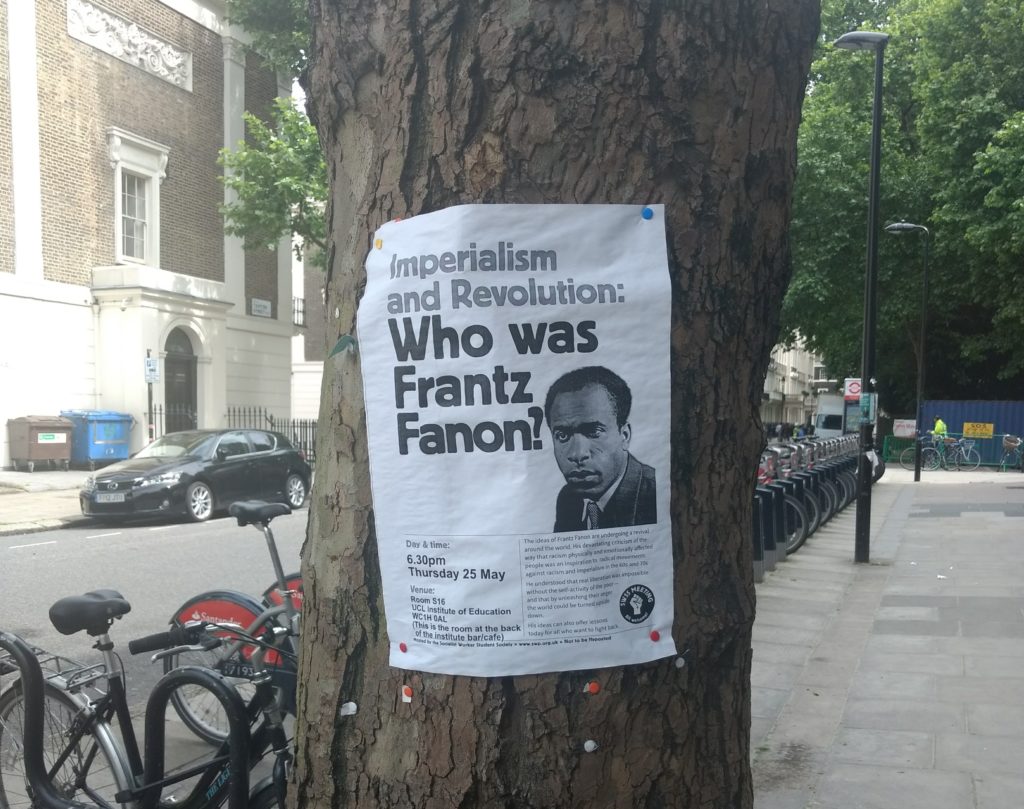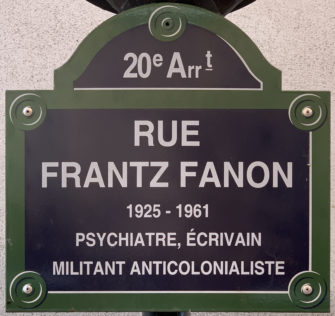
Religion remains an underattended area in contemporary study of Frantz Fanon. This is likely due to the misunderstanding informed by the normative secularist epistemic framework that dictates conversations in humanities and social sciences. The prevailing misunderstanding or bias that pits religion against decoloniality often fails to recognize the ideological (that is, colonial) baggage of the secular and its episteme. The rather simplistic, yet widely held view on Fanon’s relationship with religion, overlooks the numerous nuanced references to religion that he makes. In short, Fanon’s relationship with religion is far more complex and complicated. He constantly appeals to religion even as he deliberately turns away from it. The various streams of decolonial struggles he sets his feet in—be that a political movement or an intellectual tradition—are already entangled in a dynamic and complex interaction with religion. Both his critique of the pernicious presence of religion in social-political life and his gesture to repurpose it (as a vessel to resignify Blackness) remain understudied in contemporary Fanonian scholarship.
Beyond the Western-Secularist Framework
Fanon’s work reveals an ambiguous view of religion overall. He seems mostly critical of the role religion plays within the colonial order and often expresses strong repugnance against indigenous religions, identifying them with myth, superstition, and magic. At the same time, Fanon acknowledges religion’s place in culture as a vital ingredient that fosters national identity. As Federico Settler observes, Fanon “recognized the significance of the sacred in cohering social collectivities and in the recovery of the black self” (5). In “Daily Life in the Douars,” Fanon offers a comprehensive report on the general socio-cultural constitution of the Muslim community bound by a unifying religious identity. Here he gives one of his most sympathetic accounts of religion, sketching out the constructive function that religion plays by providing the foundation for community, security, and order (379–81). The ambivalent understanding of religion that fluctuates between two contrasting views reflects perhaps his own ongoing personal anxiety about the subject, an anxiety that often overwhelms the man who inhabits the crossroad of conflicting desires. This is a man who is constantly negotiating the negative colonial affects of denial, refusal, shame, and the desire to restore to wholeness a self split between the two radically contrasting worlds. He was at times critical of the problematic association of native religions with irrationality made by western critics even as he simultaneously reproduced the same questionable associations himself. We can see this in his different treatments of institutional religions (such as Catholicism and Islam) and indigenous religions. The latter is often an object of shame and abhorrence for Fanon. Fanon’s treatment of Islam was different from Christianity as Islam played a significant role in the Algerian revolution. He acknowledged Islam’s contribution to revolution despite his lack of a deep understanding of Islam and the full extent of its connection to the revolution. His limited understanding of the intricate interaction between religion and culture, particularly of Islam, partly overshadows his views. He did not fully understand the degree to which the tradition of anticolonial struggle in modern history of Algeria was deeply Islamic in nature. Fanon praised the self-organization of Algerian peasants in their involvement in the anti-colonial resistance but failed to understand that the origin of these movements was Islam. Fouzi Slisli unpacks the numerous cultural and historical references that Fanon makes to Algeria without acknowledging their connection to Islam.[1] Slisli wonders, “Was he ignorant of this Islamic tradition or did he choose to ignore it?” (97). Whatever the case may be, Fanon’s harsh stance towards Christianity and African (and Afro-diasporic) indigenous religions did not extend to Islam. Still his otherwise ambivalent attitude towards religion also informed his characterization of some Islamic practices. For example, he refers to the mystical Islamic worship of holy men in Algeria as maraboutism and lists it among the list of “old superstitions,” alongside witchcraft and djinn (Arabic spirits).
Fanon’s critique of the pernicious presence of religion in social-political life and his gesture to repurpose it (as a vessel to resignify Blackness) remain understudied in contemporary Fanonian scholarship.
Such a view of religion is not surprising when considering Fanon’s professionalization in western medical practice. A great part of Fanon’s deep immersion in the worldview of North African Muslims came through his clinical observation and study as a psychiatrist. During his time at the Blida-Joinville psychiatric hospital in Algeria, he treated a large group of Muslim patients. There he observed that many of his clinical tools (which came from western science) did not work efficiently on his Muslim male patients. The main reason for this discrepancy was cultural difference. The local population adhered to a completely different worldview informed by religion, which made the seamless application of western methods difficult. A dismaying aspect for him as a clinical practitioner was how often the patients’ religion-based worldview conflicted with the scientific method of the psychiatric approach. The traditional worldview grounded in religion did not help with the procedures as there was a widespread tendency among locals to attribute mental illness to a spiritual problem. Yet Fanon does not let go of his ambivalent position towards religion. Even in his characterization of Islam as rather primitive and traditional, he would not set a strict binary of values that stigmatized Islam in its entirety while uplifting the secular worldview. Discussing the traditional tribal structure of the local Muslim society, Fanon describes the transformation of land ownership implemented by the French. The process of land (wealth) redistribution aggravated the economic condition of the poor. Prior to the privatization of property, there were poor people, but not proletarians. What Fanon implies is that even when certain western innovations reflect advanced (and potentially beneficial) technology, not all such customs and implementations signify a true sense of progress.
Fanon’s views were influenced by western-secularist categories that informed modern science and academic conversations. He insinuates the link between the secular and the colonial ideology of the west, yet he often employed the dominant secularist definition of religion.[2] It is far from difficult to identify the same oversight we find in Fanon across numerous examples in contemporary conversations in critical theory. Many interlocutors in contemporary decolonial theory are critical of the secularist discourse, yet they often overlook the secularist categories that reduce religion to a narrow notion. The compound interaction between religion and power is eclipsed by the reductive concept of religion in their works. For instance, the critical study of the formation of race and (de)coloniality in the Americas is often overshadowed by the erasure of religion, an important constitutive element of (de)coloniality. The secularist epistemic framework at play here consigns knowledge and knowledge production to particular forms and locations. Like the normative ideal of the human (Man), this unmarked normative epistemic framework universalizes a particular mode of knowing as the sole arbiter of knowledge. Forms of knowing that emerge from non-western locales are measured and classified according to these normative principles. These unmarked principles are in fact heavily marked with a western-secularist inflection (rooted in Euro-Christian history), and they underlie the study of religion, particularly of non-western religions. In his latest article on Fanon, Nelson Maldonado-Torres makes an important point on the reception of Fanon’s writings by the contemporary academy. A frequent oversight when approaching Fanon’s work, Maldonado-Torres observes, is to interpret it as a traditional academic text by taking his statements at face value, thus disregarding the complex layers of the clinical and revolutionary context from which he was writing. Religion, be it a conceptual apparatus or a constitutive element of the social fabric, occupies a substantial place in the formation of anticolonial struggles and thoughts of which Fanon was a part. Reading Fanon and religion with these complexities in mind lends an interesting twist and insight: Fanon’s critique of religion (political theology) ends up being a critique of the secular, even when he is not naming it as such. His turn to secularist language as an alternative to religion seems to suggest, in turn, an alternative notion of the sacred. The disavowal of colonial religion need not disclaim the diverse forms of religion-making that take place in and through various forms of decolonial movement and imagination. The sacred molds the spirit and movement of decolonial resistance in the colony. But unlike the institutionalized forms (and understandings) of religion, the diverse registers of the sacred usually take murky shapes. And at times, they are presented as antitheses to the sacred, that is, as a disavowal of the dominant notion of the sacred (and of religion more broadly). Yet even in negation, they are not renounced. Fanon’s critique of religion winds up being a powerful critique of the secular. Contrarily, Fanon seeks refuge in the secular in order to resignify the human but he ends up repurposing religion along the way.
Many interlocutors in contemporary decolonial theory are critical of the secularist discourse, yet they often overlook the secularist categories that reduce religion to a narrow notion. The compound interaction between religion and power is eclipsed by the reductive concept of religion in their works
It is not possible to fully unpack and elaborate on the claim I made above in this limited space. I have elsewhere articulated these ideas partially and I develop them further in my forthcoming book, The Coloniality of the Secular.[3] In what follows, I briefly point to a couple of sites (among others) in Fanon’s work that offer possible directions for advancing meaningful conversations on Fanon’s anticolonial critique and the problem of religion.
Two Possible Readings
(1) Fanon offers an insightful phenomenological analysis of the political by tracing how political life is constituted by the violent sanction of normative universals and the distribution of regulative identities in the colony. A paramount insight Fanon offers here concerns religion’s place as the metaphysical foundation of the political. Fanon continuously insinuates that colonial governance cannot be administered by coercion alone. Its fundamental mechanism requires metaphysics: a theological worldview that makes the colonized accept the colonial structure as the only possible reality. A Manichean worldview of good and evil that requires “a reference to divine right… to justify [the] difference” (Fanon, 1963, 5). This is a theology that legitimates the Manichean dualism dictating colonial reality and its values. It is a theodicean order in which the White/colonizer embodies the Good and the Black/colonized represents absolute evil (50). In other words, Fanon attributes the primary characteristics of colonial violence to theology. As Michael Lackey observes, instead of suggesting that theology benefits from colonization, “Fanon argues colonization is at the service of theology, that theology is the parent and original.” Political life is a theological problem as well as a colonial problem. Fanon brings to light the ways in which the category of secular humanism often overshadows the theology (the colonial theology of Whiteness) that constitutes European humanism and its concomitant colonial vision. The secular dilutes the theological edifice of both modernity and coloniality, thus fostering a notion of modernity that distinguishes itself from normative (dogmatic) values, sectarian positions, and power. The violence of its theology and the theology of its violence are obscured by the nominal framework of the secular. The secular hinges the two ends of modernity/coloniality. Fanon’s piercing analysis of colonial modernity implies, in a way, a nuanced critique of the theological edifice that sustains the necropolitical (Mbembe) management of the colonial world.

(2) Much attention has been paid in Fanonian scholarship to the effects of the damage that dehumanization and violence enact on racialized beings, socio-politically and otherwise. Some of these voices also suggest that we pay close attention to the generative ideas that Fanon evokes. They find important constructive ideas in Fanon’s visions such as care, love (Nelson Maldonado-Torres, Houria Bouteldja), fugitivity (Fred Moten), poetics (Sylvia Wynter, Achille Mbembe), and rehumanization (Lewis Gordon), among many others. The bleak outlook we glimpse in Fanon’s penetrating diagnosis does not signal a retreat to resignation, that is, political pessimism. Fanon’s writings and commitment to political struggle consistently demonstrate that the essence of being a human lies in the possibility and capacity of praxis born out of love and solidarity. Building on these insights, we can bring our attention to the sites in Fanon that often go unnoticed, that is, some of the generative ideas that he gestures to in his poetics. Despite his complicated relationship with religion, there are numerous moments in which his appeal to generative concepts and alterity seems to beckon at a certain sense of the sacred, however alternative or unnamed it may be. Joseph Winters has recently suggested that we read the concluding prayers in Fanon’s Black Skin, White Masks as a repurposing of Blackness as sacred, “a sacred gone astray” (258). In the face of suffocating colonial-racial violence, Fanon tenaciously refuses to renounce the possibility of an otherwise. Against the common (mis)perceptions, we can read religion as a reservoir of such possibility for Fanon. His lengthy, pessimistic account concludes with a religious rhetoric that signals hope in which he recreates Blackness as the embodied signifier of the sacred. Put differently, what takes place in Fanon’s phenomenological reflection on his racialized body is a reconstruction of the sacred. The secular humanist’s staunch rejection of western religion and metaphysics unfolds, paradoxically, alongside the unnamed figure or moment that evokes a certain sense of the sacred, a sacred presented as an antithesis to the sacred.
Fanon’s critique of religion winds up being a powerful critique of the secular. Contrarily, Fanon seeks refuge in the secular in order to resignify the human but he ends up repurposing religion along the way.
On the one hand, a closer look at the phenomenological method that Fanon employs opens up the possibility of building on the connection between his repurposing of Blackness and religion. Fanon relies on many of Maurice Merleau-Ponty’s concepts—many of whose ideas were formed in conversation with Catholic theology—in his phenomenological reading of Blackness. On the other hand, we can situate Fanonian poetics within the twentieth century Caribbean tradition of anticolonial poetics. In many ways, Fanon’s poetics are a direct response and a reaction to Aime Cesaire’s anticolonial poetics, which are heavily infused with theological concepts and symbols. In this sense, Fanonian poetics inherit the theological themes and imagery that Cesaire’s poetics inaugurated. It is the Jamaican philosopher and theorist Sylvia Wynter who develops a full-fledged account of political theology by honing the questions and problems that are dormant in Cesaire and Fanon. Poetics disrupts the normative narrative. They seek to (re)create the world by reconceptualizing symbols and meanings. The decolonial refusal in Fanon signals a moment of decolonial poetics. By reconceptualizing theological symbols ingrained in secular registers, Fanon gestures at the possibility of a decolonial otherwise.
What happens when we read religion as a key fabric of social reality that constitutes both the colonial reality and the intellectual traditions that shaped Fanon’s vision, regardless of how much he was aware of it? What are the insights and perspectives we might gain when we view religion as a segue into decolonial resistance for Fanon? Coloniality censors sacrality, as Talal Asad and Peter Van der Veer have shown. That the secular has consistently provided an efficient platform for the articulation of coloniality raises important questions about the relation between decoloniality and the boundaries that segregate the sacred. When the sacred is isolated from the fabric of social relations, it obscures the enduring power of religion that is carved deep in the fabric of political life. It makes us lose sight of the symbolic power that sustains the colonial order which functions as a theological commandment (111).
[1] Much of the anticolonial rebellion in 19th century Algeria was led by Islamic groups and leaders. As Fouzi Slisli points out, the spontaneity of rural-Algerians’ self-organization that Fanon praises was shaped significantly by this historical tradition (Islamic anti-colonial struggle).
[2] While Fanon does not name the link between colonialism and the secular as such, he constantly insinuates that colonialism is founded on a religious (Christian) worldview and metaphysics, one that operates according to a theological mechanism or logic. In other words, Fanon challenges the myth of secular-modernity by calling out the theological logic operative in colonialism (and colonial modernity). See Frantz Fanon, The Wretched of the Earth; An Yountae, “On Violence and Redemption: Fanon and Colonial Theodicy.”
[3] “Decolonizing the Cosmo-polis: Cosmopolitanism as a Rehumanizing Project” in Decolonial Christianities: Latinx and Latin American Perspectives; “On Violence and Redemption: Fanon and Colonial Theodicy,” in Beyond Man: Race, Coloniality, and Philosophy of Religion; The Coloniality of the Secular: Race, Religion, and Poetics of World Making (Durham, NC: Duke University Press, forthcoming).


Interesting insight. I often wondered why India remained largely untouched religion-wise whereas the rest of the colonies were converted? Christianity was used as a tool of colonialism too. It was shown as the sanitized religion of the progressive West and other religions were primitive (shown to be). Fanon finding Islam as primitive is interesting because, he had subscribed to the colonial perception of religion.